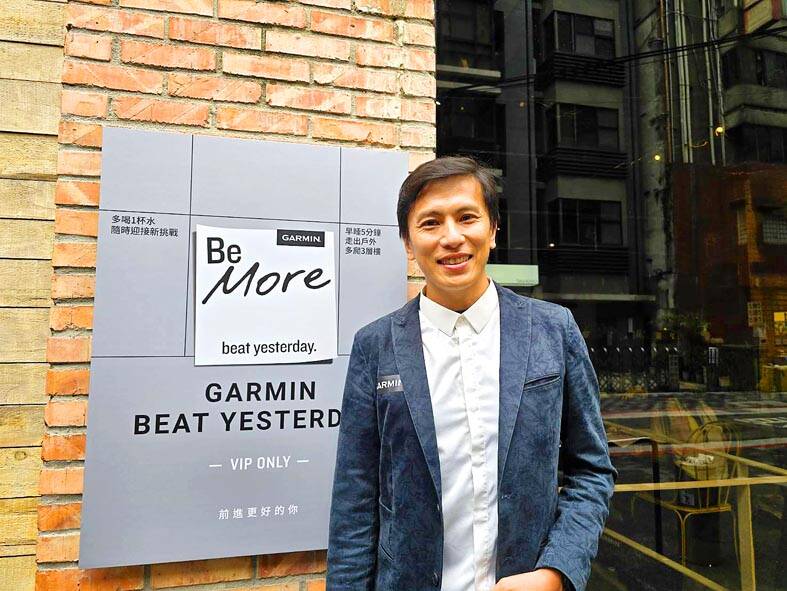US-based Garmin, a GPS navigation solution and wearable device provider, plans to invest in Southeast Asia as part of efforts to improve the resilience of its supply chain.
The company is to begin investment next month, with production set to start in 2026, but the location of the plant would not be announced until next month, Garmin marketing and business vice president for Asia Lin Meng-yuan (林孟垣) said.
The move, which has been in the works for some time, is aimed at diversifying Garmin’s production base and strengthening its supply chain resilience by building closer ties with suppliers there, Lin said.

Photo: CNA
Strengthening the company’s supply chain is critical, because Garmin tends to require short lead times for products and more than two suppliers for every component the company purchases, Lin added.
The investment project, which would initially focus on auto navigation products, is expected to help spur the company’s growth over the next 10 to 30 years, Lin said.
Garmin, which was cofounded by Min Kao (高民環), a Taiwanese, has maintained 90 percent of production in Taiwan and employs about 10,000 people in the country.
However, the relocation was not focused on lowering manufacturing costs, Lin said.
In Taiwan, Garmin has production sites in Sijhih (汐止) and Linkuo (林口) districts in New Taipei City, Jhongli District (中壢) in Taoyuan and Tainan, where the company expanded capacity in 2021, Lin said.
It has also set up a research and development center in New Taipei City’s Sindian District (新店), reflecting its efforts to invest in Taiwan, Lin added.
Outside the nation, Garmin has 10 production bases in the US and Europe.
Garmin expects its sales to grow by 10 percent on average this year, with revenue in Asia to grow 19 percent and outperform, despite foreign exchange losses in Japan and a slow economic recovery in China.
Sales in Taiwan, which is considered to be a mature market, are expected to grow by 10 percent this year, while the markets in Indonesia, Vietnam, Singapore and Malaysia are to grow steadily.

When an apartment comes up for rent in Germany’s big cities, hundreds of prospective tenants often queue down the street to view it, but the acute shortage of affordable housing is getting scant attention ahead of today’s snap general election. “Housing is one of the main problems for people, but nobody talks about it, nobody takes it seriously,” said Andreas Ibel, president of Build Europe, an association representing housing developers. Migration and the sluggish economy top the list of voters’ concerns, but analysts say housing policy fails to break through as returns on investment take time to register, making the

‘SILVER LINING’: Although the news caused TSMC to fall on the local market, an analyst said that as tariffs are not set to go into effect until April, there is still time for negotiations US President Donald Trump on Tuesday said that he would likely impose tariffs on semiconductor, automobile and pharmaceutical imports of about 25 percent, with an announcement coming as soon as April 2 in a move that would represent a dramatic widening of the US leader’s trade war. “I probably will tell you that on April 2, but it’ll be in the neighborhood of 25 percent,” Trump told reporters at his Mar-a-Lago club when asked about his plan for auto tariffs. Asked about similar levies on pharmaceutical drugs and semiconductors, the president said that “it’ll be 25 percent and higher, and it’ll

CHIP BOOM: Revenue for the semiconductor industry is set to reach US$1 trillion by 2032, opening up opportunities for the chip pacakging and testing company, it said ASE Technology Holding Co (日月光投控), the world’s largest provider of outsourced semiconductor assembly and test (OSAT) services, yesterday launched a new advanced manufacturing facility in Penang, Malaysia, aiming to meet growing demand for emerging technologies such as generative artificial intelligence (AI) applications. The US$300 million facility is a critical step in expanding ASE’s global footprint, offering an alternative for customers from the US, Europe, Japan, South Korea and China to assemble and test chips outside of Taiwan amid efforts to diversify supply chains. The plant, the company’s fifth in Malaysia, is part of a strategic expansion plan that would more than triple

Taiwanese artificial intelligence (AI) server makers are expected to make major investments in Texas in May after US President Donald Trump’s first 100 days in office and amid his rising tariff threats, Taiwan Electrical and Electronic Manufacturers’ Association (TEEMA, 台灣電子電機公會) chairman Richard Lee (李詩欽) said yesterday. The association led a delegation of seven AI server manufacturers to Washington, as well as the US states of California, Texas and New Mexico, to discuss land and tax issues, as Taiwanese firms speed up their production plans in the US with many of them seeing Texas as their top option for investment, Lee said. The